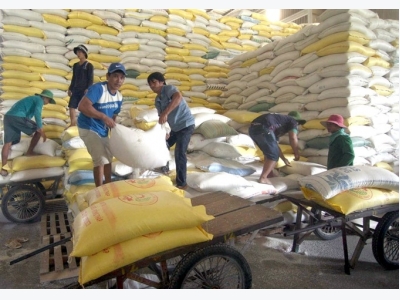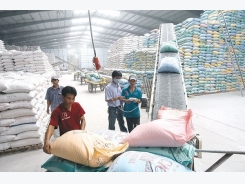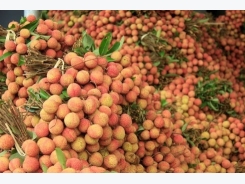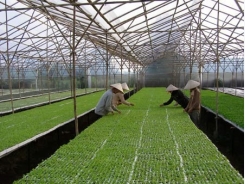New decree to help rice exporters

Rice bags loaded for export at Đồng Tháp Food Co. - VNA/VNS Photo Vũ Sinh
HÀ NỘI — The Ministry of Industry and Trade is drafting a decree to remove bottlenecks for domestic rice exporters, especially small-and medium-sized enterprises (SMEs).
The decree, replacing Decree 109/2010/NĐ-CP on rice export and business, is expected to take effect from January 1, 2018, after which businesses will be able to engage in the free trade of rice without quantitative restrictions.
The decree also removes regulations of criteria for businesses to be eligible to export rice, as well as the floor prices set for rice shipments.
Phạm Thái Bình, director-general of Trung An Co Ltd in the Mekong Delta city of Cần Thơ, said some articles in the old decree hindered the development of rice export firms.
For example, in early June 2017, the ministry signed a Memorandum of Understanding (MoU) on rice trading with Bangladesh, which is valid until 2022.
Under the MoU, Việt Nam will export one million tonnes of rice to Bangladesh annually. This offers a huge opportunity for Việt Nam to boost exports of this staple grain, build a rice brand and connect with farmers.
However, under the decree 109 which is still being enforced, the Việt Nam Food Association authorised the Northern Food Corporation and the Southern Food Corporation to realise the MoU. Other companies have to seek trade deals with partners in other markets.
Bình said the involvement of the Government in seeking contracts was good for Vietnamese agriculture, but all businesses should be able to join this activity to promote trade in foreign markets.
Rice export businesses require a closely linked chain from farmers to exporters, thus when exporters face difficulties in seeking consumption markets, then farmers’ production will also be affected, Bình said.
Võ Minh Khải, director-general of Viễn Phú Organic – Healthy Food Company from the southernmost province of Cà Mau, said that over the past years, rice enterprises that were small scale but produced high-quality rice had not been able to bring their products to the world market.
To export their rice, they had to depend on large companies as intermediaries. Therefore, revising the old decree would create a level-playing field for small rice export firms to proactively access the global market, Khải said.
The new document will also enable businesses to invest in producing high-quality products to compete with rivals from Thailand and Cambodia, he added.
Promoting high-quality brands
Việt Nam has exported rice for nearly 30 years, with the first amount of 1.4 million tonnes in 1989 grossing US$310 million in turnover. In 2006, the country earned $2.1 billion from selling 4.9 million tonnes of rice abroad.
Vietnamese rice has not created a strong brand in the world market.
So far, worldwide consumers mostly knew Vietnamese rice products as 5-per cent broken rice or 25-per cent broken rice, rather than by a specific name.
Bình said that under the situation, many types of Vietnamese high-quality rice were being sold under foreign names.
In fact, many types of high-quality Vietnamese rice such as ST, Jasmine, Hoa Sữa and Lộc Trời were being exported, but the export volumes had not met the demand of importers.
Lê Thanh Tùng, an official from the Ministry of Agriculture and Rural Development, said that the decree would create conditions for rice exporters, even small- and medium-sized one, to access directly with importers, help promote Vietnamese rice brands more easily and prevent trade fraudulence.
Võ Hùng Dũng, Director of the Cần Thơ-based branch of the Việt Nam Chamber of Commerce and Industry, said that changes in the rice business policy would force enterprises to operate and develop under the market mechanism, and find ways to strengthen their reputation in the world market.
"Rice enterprises having strong reputation also means Vietnamese rice brands will be promoted," Dũng added
Related news
Tools

Phối trộn thức ăn chăn nuôi

Pha dung dịch thủy canh

Định mức cho tôm ăn

Phối trộn phân bón NPK

Xác định tỷ lệ tôm sống

Chuyển đổi đơn vị phân bón

Xác định công suất sục khí

Chuyển đổi đơn vị tôm

Tính diện tích nhà kính

Tính thể tích ao




 Officials, business slam agriculture investment incentives
Officials, business slam agriculture investment incentives  Making farming in the clouds a reality in…
Making farming in the clouds a reality in…